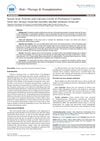 30 citations,
January 2000 in “Dermatologic Clinics”
30 citations,
January 2000 in “Dermatologic Clinics” Finasteride and minoxidil are effective FDA-approved treatments for androgenetic alopecia.
 February 2024 in “BioMetals”
February 2024 in “BioMetals” Heavy metals like arsenic, cadmium, and lead can increase cancer risk and worsen outcomes.
 November 2009 in “Regenerative Medicine”
November 2009 in “Regenerative Medicine” The regenerative medicine industry saw business growth with new partnerships, clinical trials, and financial investments.
 22 citations,
April 2006 in “Journal of The American Academy of Dermatology”
22 citations,
April 2006 in “Journal of The American Academy of Dermatology” More research is needed to determine if iron deficiency causes hair loss.
 November 1997 in “Postgraduate Medicine”
November 1997 in “Postgraduate Medicine” Robert T. Leonard Jr. disagrees with Max Rubin's negative views on hair loss treatment, advocating for hormonal tests in women and supporting the use of medications and surgery for androgenetic alopecia.
 February 2005 in “Journal of The American Academy of Dermatology”
February 2005 in “Journal of The American Academy of Dermatology” Metabolic syndrome can cause serious health issues and should be considered when treating women with severe acne.
15 citations,
April 2016 in “Medicine” SLE patients with Evans syndrome often show blood issues and need careful monitoring and treatment.
 May 2024 in “World Journal Of Advanced Research and Reviews”
May 2024 in “World Journal Of Advanced Research and Reviews” Low iron levels are strongly linked to chronic hair loss in women.
 1 citations,
August 2023 in “Cutis”
1 citations,
August 2023 in “Cutis” Low ferritin levels can indicate iron deficiency as a cause of hair loss.
 11 citations,
September 1997 in “Archives of Dermatology”
11 citations,
September 1997 in “Archives of Dermatology” Reduced androgens linked to kinky hair disorder and hair loss; 5a-reductase inhibitors may help.
 70 citations,
April 2016 in “Experimental Dermatology”
70 citations,
April 2016 in “Experimental Dermatology” A patient with alopecia areata regrew hair after taking tofacitinib and showed changes in certain blood and skin markers.
1 citations,
September 2019 in “Journal of cosmetic dermatology” Lead and selenium levels don't cause premature graying.
 May 2024 in “Medicine today”
May 2024 in “Medicine today” Older age, family history, and low iron levels increase the risk of female hair loss.
 1 citations,
October 2020 in “Journal of Cosmetic Dermatology”
1 citations,
October 2020 in “Journal of Cosmetic Dermatology” Low iron levels are linked to premature graying of hair, but vitamin D levels are not.
 February 2022 in “Journal of Cosmetic Dermatology”
February 2022 in “Journal of Cosmetic Dermatology” Women with pattern hair loss may have more stress in their bodies due to a lack of NRF2, a protein. Eating healthy and losing weight could help reduce this stress and improve hair loss. NRF2 boosters might also help treat this type of hair loss.
 8 citations,
June 2020 in “International Journal of Dermatology”
8 citations,
June 2020 in “International Journal of Dermatology” Men with early hair loss have lower vitamin D levels.
 2 citations,
May 2018 in “Journal of the American Academy of Dermatology”
2 citations,
May 2018 in “Journal of the American Academy of Dermatology” Low vitamin D might be one of several factors involved in the hair loss condition alopecia areata.
1 citations,
May 2011 in “Hair transplant forum international” Injectable ACell with blood serum/PRP may slow hair loss and regrow thinning hair.
 65 citations,
October 1999 in “Journal of The American Academy of Dermatology”
65 citations,
October 1999 in “Journal of The American Academy of Dermatology” Finasteride effectively reduces hair loss by decreasing androgen levels.
 8 citations,
February 2007 in “Journal of The American Academy of Dermatology”
8 citations,
February 2007 in “Journal of The American Academy of Dermatology” Higher serum ferritin levels than currently used might be needed to rule out iron deficiency in women with hair loss.
 March 2014 in “Journal of The American Academy of Dermatology”
March 2014 in “Journal of The American Academy of Dermatology” Vitamin D deficiency is common in temporary hair loss, and stress is often a suspected cause.
 32 citations,
August 1999 in “Journal of Investigative Dermatology”
32 citations,
August 1999 in “Journal of Investigative Dermatology” Early onset hair loss linked to genetics and androgen levels.
 November 2022 in “SAS journal of medicine”
November 2022 in “SAS journal of medicine” There's no link between low iron levels and the hair loss condition, alopecia areata.
 7 citations,
January 2016 in “Hair therapy & transplantation”
7 citations,
January 2016 in “Hair therapy & transplantation” People with early graying hair often have lower levels of iron, ferritin, and calcium.

Women with androgenetic alopecia (hair loss) have normal prostate specific antigen levels but higher testosterone levels.
 163 citations,
November 2003 in “Journal of Investigative Dermatology”
163 citations,
November 2003 in “Journal of Investigative Dermatology” Low iron levels may be linked to some types of hair loss in women.
 89 citations,
December 2006 in “Lancet Oncology”
89 citations,
December 2006 in “Lancet Oncology” Taking 1 mg/day finasteride for hair loss significantly lowers PSA levels in men, which may affect prostate cancer screening.
 3 citations,
January 2017 in “Journal of Pakistan Association of Dermatology”
3 citations,
January 2017 in “Journal of Pakistan Association of Dermatology” Women with certain types of hair loss may have low iron levels, and iron supplements could help.
 1 citations,
October 2020 in “Journal of Cosmetic Dermatology”
1 citations,
October 2020 in “Journal of Cosmetic Dermatology” Possible link between hair loss and metabolic syndrome, with RANTES as a potential clue.
 16 citations,
January 2000 in “The Journal of clinical endocrinology and metabolism/Journal of clinical endocrinology & metabolism”
16 citations,
January 2000 in “The Journal of clinical endocrinology and metabolism/Journal of clinical endocrinology & metabolism” Antiandrogen drugs can reduce PSA levels in women with excess hair, suggesting PSA is a sign of male hormone activity in women.



























